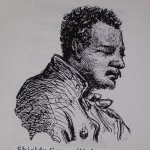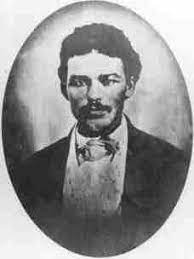The Eugene L. Meyer Papers
At the risk of sounding grandiose, I’m pleased to announce that The Eugene L. Meyer Papers are now available for public inspection at the Hornbake Library of the University of Maryland. I have donated 23 linear feet of files to the Maryland collection at the library from my many years of covering and writing about the state for The Washington Post and other publications. The university has blogged about the collection here. From the blog:
“The Eugene L. Meyer papers contain a range of material about Maryland. Meyer’s work took him all over the state, leading him to collect everything from restaurant menus to business cards, postcards, and maps. His research notes show his process as he engaged with each location and turned his experience into compelling and newsworthy articles. Also included in the collection are photographs, both black and white and in color, that document different places in Maryland. There are dozens of notebooks and legal pads with Meyer’s detailed notes for his pieces. This collection has unique material from almost every county in Maryland, showcasing the breadth of Meyer’s work from throughout the state. ”
More details about the collection can be found here on the university’s finding aid site.
The collection at the University of Maryland is in addition to two other donations of papers from my archives. One recipient (of 6.22 linear feet, 7 boxes) is the Smithsonian Anacostia Community Museum. Click here. From the summary on the museum’s website:
“The papers include correspondence; clippings; research files; newsletters; handwritten notes; drafts of some of Meyer’s articles; as well as editions of a Washington, DC neighborhood newsletter, which Meyer edited from 1989 to 1995. Also included in the collection are photographic slides of Washington, DC on Easter Sunday in April 1968, just days following the assassination of Reverend Dr. Martin Luther King, Jr. and the subsequent civil disturbances.”
The other donation resides with the Montgomery County Historical Society. “Eugene L. Meyer Collection” (4 cubic feet) to the Montgomery County Historical Society, now known as Montgomery History. “This collection contains articles and research by author Eugene Meyer, including material related to his articles published in the Washington Post from 1981 to 1984, and in Bethesda Magazine from 2007-2015. It also includes background research material on unpublished or unfinished articles. Material consists of drafts of articles, email correspondence with editors and colleagues, newspaper clippings, photographs, notes, interviews with sources, and some audio/visual material (DVDs and CDs). This collection will be useful to those who are researching specific elements of Montgomery County history, particularly if they wish to see how an event or topic was covered from the perspective of a local researcher and historian.
On This Date in History
On Dec. 16, 1859, two of the five African Americans who went with John Brown to Harpers Ferry in October 1859 to seize the federal arsenal and incite a slave insurrection were hanged in Charlestown, Virginia, now West Virginia. They were Shields Green, the youngest of the five, from the Charleston, South Carolina, and John Anthony Copeland, from Oberlin,, Ohio. Green, said to be descended from African royalty, was also known as “Emperor.”

He had meet Brown while living with Frederick Douglass in Rochester, New York. They met again outside an abandoned quarry in Chambersburg, Pa., in August 1859. Brown hoped to recruitDouglass to join in the raid, but the famous abolitionist demurred, telling Brown he would be walking into a “steel trap” from which he’d never emerge. Douglass asked Green what he wanted to do, and the reply was “I think I’ll go with the old man.” Which he did. As a slave who could not be considered a citizen under the Dred Scott decision, Green was acquitted of treason but convicted on other counts that merited the death penalty.
Copeland was a carpenter who had attended Oberlin College prep school for a year. His parents were free Blacks who had emigrated from North Carolina in the 1830s, after the state disenfranchised all African Americans, even the free persons of color, from voting. Copeland wrote many letters from his cell in Charlestown, including to his parents, three brothers and two sisters on the morning of his execution. It is heart-wrenching to read it, as I do whenever I tell the story from my book Five for Freedom: The African Americans in John Brown’s Army.
“The last Sabbath with me on earth has passed away,” he wrote. “I have seen declining behind me the western mountains for the last time. Last night, for the last time, I beheld the soft bright moon as it rose, casting its mellow light into my felon’s cell, dissipating the darkness and filtering it with that soft pleasant light which causes such thrills of joy to all those in like circumstance with myself.
“This morning, for the last time, I beheld the glorious sun of yesterday rising in the far-off East, away off in the country where our Lord Jesus Christ first proclaimed salvation to man, and now as he rises higher, and high bright light takes the place of soft moonlight, I will take my pen, for the last time, to rite you who are bound to me by those strong ties. (yea, the strongest that God ever instituted) the ties of blood and relationship…
“Dear parents, brothers and sisters, it is true that I am now in a few hours to start on a journey from which no traveler returns… We shall meet in Heaven, where we shall not be parted by the demands of the cruel and unjust monster Slavery… But think not that I am complaining, for I feel reconciled to meet my fate. I pray God that his will be done, not mine.
“Let me tell you that it is not the mere act of having to meet death, which I should regret… but that such an unjust institution should exist as the one which demands my life… I beg of you one and all that you will not grieve about me, but that you will thank God that he spared me time to make my peace with Him…
“And now, dear ones, attach no blame to anyone for my coming here, for not any person but myself is to blame. … I have no antipathy against anyone. I have freed my mind of all hard feelings against every living being, and I ask all who have anything against me to do the same.
“And now dear parents, brothers and sisters, I must bid you to serve your God and meet me in heaven….Dear ones, he who writes this, will in a few hours be in this world no longer…Yes, these fingers which hold the pen will, before today’s sun has reached his meridian, have laid it aside forever, and this poor soul have taken its flight to meet its God.
“And now dear ones I must bid you that last. long sad farewell. Good-day, Father, Mother, Henry, William, and Freddy, Sarah and Mary, serve your God and meet me in heaven. Your Son and Brother to eternity. John A. Copeland.”
Leaving his cell on the way to the gallows, Copeland said: “If I am dying for freedom, I could not die for a better cause. I had rather die than be a slave.”

Good for you, Gene, for donating your papers. I discovered a treasure trove for my next book, “The Silenced Muse: Emily Hale, T.S. Eliot and the Role of a Lifetime,” in the papers of former Time magazine editor T. S. Matthews. I plan to give parts of my research projects to archives where I hope they can be helpful to “the next person.”
Hey Sara, my name is Harry Matthews and I am the grandson of TS Matthews. The whole family was overjoyed to see your new book about his writing of the Eliot biography, “Great Tom”. I just wanted to thank you for all your efforts in that regard. I’ve been in touch with the publisher, (Christine?) and she sent us a couple copies… I’m enjoying it very much! Great job!
Congratulations.
What a good thing to do. You are leaving a great resource for the future and a legacy for yourself.
. Mazel Tov! Happy Holidays to you and your loved ones.
Congratulations, Gene.
Dear Gene,
I came from the Post Partums group and your account of the 1968 race riots in DC and enjoyed poking around on your website. Keep it up.
Best,
Freddy